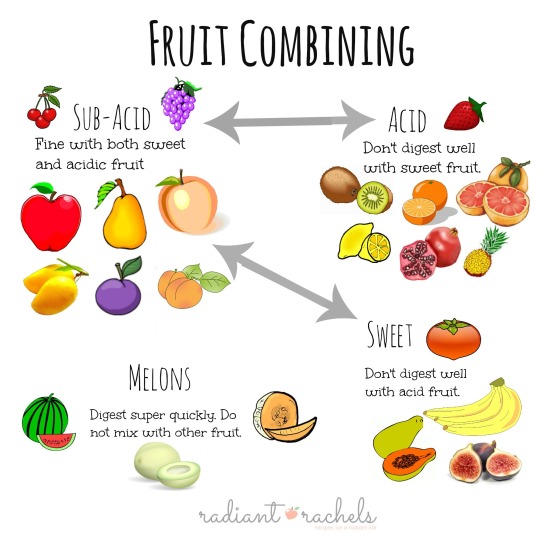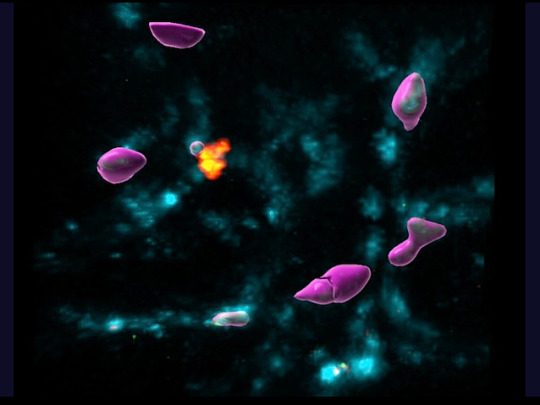#inflammation
Text
Researchers connecting pieces of the massive Alzheimer's puzzle are closer to slotting the next one in place, with yet another link between our guts and brain.
Recent animal studies have demonstrated Alzheimer's can be passed on to young mice through a transfer of gut microbes, confirming a link between the digestive system and the health of the brain.
A new study adds further support to the theory that inflammation could be the mechanism through which this occurs.
Continue Reading.
83 notes
·
View notes
Text

77 notes
·
View notes
Text
"One in five Americans will experience major depressive disorder in their lifetime, and many will not find relief from current therapies. But now researchers have identified an unexpected source of the problem: inflammation.
Inflammation in the body may be triggering or exacerbating depression in the brains of some patients. And clinical trial data suggests that targeting and treating the inflammation may be a way to provide more-precise care.
The findings have the potential to revolutionize medical care for depression, an often intractable illness that doesn't always respond to conventional drug treatments. While current drug treatments target certain neurotransmitters, the new research suggests that in some patients, depressive behaviors may be fueled by the inflammatory process.
It appears that inflammatory agents in the blood can break down the barrier between the body and the brain [and specifically the blood-brain barrier], causing neuroinflammation and altering key neural circuits, researchers say. In people at risk for depression, inflammation may be a trigger for the disorder.
Research suggests that only a subset of depressed patients - roughly 30 percent - have elevated inflammation, which is also associated with poor responses to antidepressants. This inflammatory subgroup may be a key to parsing out differences in underlying mechanisms for depression and personalizing treatment...
The inflamed body and the depressed brain
...A number of studies show that depressed patients tend to have increased inflammation compared with non-depressed subjects, including more inflammatory cytokines and C-reactive protein — which is produced by the liver in response to inflammation — circulating in the blood. Patients with autoimmune diseases have inordinately high rates of depression. And postmortem brain samples from people who died by suicide showed more activation of the brain’s immune cells, which release inflammatory agents.
Crucially, pro-inflammatory drugs can induce people to become depressed, which suggests a causative link. In one seminal study published in the New England Journal of Medicine, Miller and his colleagues conducted a double-blind study of 40 cancer patients undergoing treatment with interferon-alpha, an inflammatory cytokine.
Though none of the patients had depression to begin with, the inflammatory agent had a striking effect: Many became depressed, a finding that has been consistently replicated.
"The patients recognize pretty much immediately that, 'Hey, you gave me something, and now I feel this way. I don't know why I feel this way,'" Miller said.
Can treating inflammation treat depression?
If inflammation can induce or exacerbate depression and its symptoms, then reducing inflammation could provide relief.
Even if inflammation is a disease modifier rather than the cause of the problem, “you have to take care of it in order for you to be able to get your therapeutics working to restore your circuitry and what’s happening in the mind,” said Eleonore Beurel, a professor of psychiatry and behavioral sciences at the University of Miami Miller School of Medicine.
Anti-inflammatory drugs, used alone or in conjunction with a standard antidepressant, may help some depressed patients. A 2019 meta-analysis encompassing almost 10,000 patients from 36 randomized clinical trials found that different anti-inflammatory agents, including NSAIDs, cytokine inhibitors and statins, could improve depressive symptoms...
“We’ve come to the tipping point,” Miller said. “And we know enough at this point to begin to target the immune system and its downstream effects on the brain to treat depression. We are there.”
How to manage your own inflammation
Experts agreed that people should not take anti-inflammatories without talking with their health-care provider. Your doctor can order a C-reactive protein blood test to measure your level of inflammation.
“There are so many patients who do not respond to antidepressants,” said Ole Köhler-Forsberg, a physician and associate professor of psychiatry at Aarhus University who has given anti-inflammatory drugs to his patients in addition to antidepressants. “So there is the issue of how can we improve the individual outcomes.” Tailoring treatment for each individual on a holistic basis may add some benefit.
More clinical tests for inflammatory markers may be a way to differentiate the effectiveness of antidepressant treatment. If confirmed, it would “be the first actual biomarker in psychiatry,” Raison said. “I mean, we’ve been looking for biomarkers for 50 years and had zero luck. And it’s ironic that it’s not a brain chemical.”
In the meantime, “you get much more mileage out of the lifestyle changes than you would out of supplements or any other over-the-counter drugs at this point,” Miller said."
-via The Washington Post (via Yahoo News), February 24, 2023
#depression#cw sui mention#cw suicide mention#inflammation#autoimmune#cytokines#neuroscience#medical news#medical research#anti inflammatory#antidepressants#ssri#mental health#mental illness#good news#hope#way way more details at the source btw
175 notes
·
View notes
Text

I like to re post this every now and again because it's good advice I frequently forget.
Also I post it in part because I'm laying in bed with Covid (for the first time) at the moment and eating as much fruit as I can to expedite recovery. I grabbed a banana and orange, ate the banana and asked myself if this was a good combo or not. Glad I checked, because it was not. The last thing I need is indigestion.
But because it's me, my main focus has been doubling down on nutrition and observing my own results. I was eating plant based before, but sometimes I went a little too hard on the peanut butter trail mix, breads, or other sweet treats.
My doctor said rest and hydrate, but I took it a step further and since testing positive have cut out wheat, sugar, and any kind of dairy or processed foods. I figure nothing that could make inflammation worse. I've been consuming tons of herbs like cinnamon, ginger, echinacea, and turmeric while eating fresh citrus fruits like lemon, orange, strawberry, and pineapple daily.
Now I did a bit of tooling about the internet to see if any studies had been done over the last four years regarding a plant based diet and it's effects on Covid. The results were hopeful.
I found one study that said,
"Merino et al revealed that healthy plant-based foods could decrease the risk and severity of COVID-19.21 In this large survey, it was shown that as the quality of the diet rises, the risk of disease COVID-19 (HR 0.91) and severe COVID-19 (HR 0.59) diminishes.
Which gave me hope so I kept digging.
Another one stated, "Compared with an omnivorous Western diet, plant-based diets containing mostly fruits, vegetables, grains, legumes, nuts and seeds, with restricted amounts of foods of animal origin, are associated with reduced risk and severity of COVID-19. "
And I can tell you that has been my experience thus far. I developed a fever that went away after 24 hours and didn't go over 100.4. My only other symptom has been a stuffy nose with sinus pressure. Im definitely tired and need to limit activity but I can still taste and smell, breathe through my nose a decent amount of the time, and I'm not coughing. I'm lucky in that I have time off from work and for that I am grateful, as rest is another key component.
And why would a plant based diet be so beneficial for mitigating Covid symptoms? Because, "plant-based dietary patterns are rich in antioxidants, phytosterols and polyphenols which positively affect several cell types implicated in immune function and exhibit direct antiviral properties."
The full study can be found if you pop this into Google::
Acosta-Navarro JC, Dias, LF, de Gouveia LAG et al. Vegetarian and plant based diets associated with lower incidence of COVID-19. BMJ Nutr Prev Health 2024:e000629. doi:10.1136/bmjnph-2023-000629
I was really scared at first and this information helped me feel more empowered in my health and recovery. It's not a substitute for any medical attention or prevention like vaccines, hand washing, and mask wearing- all things I was doing regularly prior to getting sick which may have also been variables in keeping my symptoms down. A little help goes a long way.
Has any other plant based person had a similar experience? Let me know.
#food#vegan#foodie#healthy#health#vegetarian#fitness#diet#nutrition#plant based#plant based diet covid#covid conscious#covid recovery#covid vegan#study#herbology#herbs#inflammation#fitblr#healthy lifestyle#long covid
29 notes
·
View notes
Text
Got my blood work done for the doctor and got some of my results back. From what I understand, I have a lot of inflammation in my body. Which, duh. But it's cool to have something say that for me.
Lyme came back negative.
RA came back negative.
I am still waiting for the ANA screening to come back, which my med nurse this morning said it could take a couple of weeks because it needs to go through specialized testing.
Anyways I'm just excited that there is proof I'm feeling this way.
#chronic illness#disability#blood work#chronically ill#chronic disability#chronic pain#inflammation#invisible illness
23 notes
·
View notes
Text

T for Tolerant
Single cell analyses and live-imaging in mouse gut reveals mechanisms underlying tolerance of the immune system's regulatory T cells to chronic bacterial infection and the intestinal niches where this takes place. Greater understanding of the disruption of tolerance which results in colitis
Read the published research article here
Still from video from work by Yisu Gu and Raquel Bartolomé-Casado, and colleagues
Kennedy Institute of Rheumatology, NDORMS, University of Oxford, Oxford and Wellcome Sanger Institute, Wellcome Genome Campus, Hinxton, Cambridge, UK
Video originally published with a Creative Commons Attribution 4.0 International (CC BY 4.0)
Published in Nature, April 2024
You can also follow BPoD on Instagram, Twitter and Facebook
#science#biomedicine#immunofluorescence#biology#immunity#immune response#colitis#inflammation#gut bacteria#microbiome
11 notes
·
View notes
Note
A weird thing happened, but I won't bore you with the details and head straight for the question:
Is it possible for a "lump" (possible tumor?) to just up and disappear?
(if more details/background are wanted I can add of course)
(I am in contact with a vet, but I haven't had the chance to specifically ask this in between instructions and other stuff)
Hello, it's Sueanoi here.
I can think of one possibility at the top of my head. Lumps that can disappear are usually inflammation swelling. Sometimes a clump of white blood cells can accumulate in such a way that it doesn't become an abscess that we can lance out. Once the cause of inflammation is gone, the swelling disappears.
I am not able to be sure that this is correct, but I hope that my guess is useful.
24 notes
·
View notes
Text
eds pals (or honestly anyone) with inflammation problems read this!!
i saw an absolutely incredible orthopedist today who suspects i have arthritis, and he recommended i try tart cherry or pineapple bc those apparently can help with inflammation! i got juice to start with but he also recommended pill forms. will def keep y'all posted if i notice any difference, but i honestly didn't even know i was inflamed to begin with so idrk what im looking for lmao. wanted to share this nugget of knowledge with y'all tho bc he was incredible for the whole appointment and i trust his word.
#ehlers danlos syndrome#arthritis#chronic illness#chronically ill#spoonie#disabled#disability#inflammation#chronic illness tips
15 notes
·
View notes
Text
"...intense hot flashes are associated with an increase in C-reactive protein..."
28 notes
·
View notes
Text
Being chronically ill is crazy because I’m essentially just living with multiple warning lights on my dashboard lit up but if an otherwise able bodied person suddenly had their body’s check engine light on they’d go into a coma
We built different
#chronically ill#chronic illness#chronic pain#costochondritis#inflammation#i’m physically disabled#pots#postural orthostatic tachycardia syndrome#fibromyalgia#hypermobility spectrum disorder#neuropathy#cold urticaria
63 notes
·
View notes
Text
Why Experts Say You Shouldn’t Run With COVID-19:
While it’s often fine to exercise with a cold, experts say you should avoid intense activity when it comes to the coronavirus
Runner's World article.
Excerpts for accessibility:
https://www.reddit.com/r/Coronavirus/comments/172464l/comment/k3u9d5g/
https://twitter.com/Dakota%5C_150/status/1710140660605391314
in May 2023, researchers published a literature review in Frontiers in Physiology to determine if high-intensity activity could be dangerous for someone with COVID infection. While intense exercise does come with benefits—such as improved cardiovascular function and metabolic health—they concluded that during and after a COVID infection, intense exercise influences the levels of stress hormones (adrenaline, noradrenaline, and dopamine), which may make COVID symptoms more severe.
[...]
“We see systemic inflammation with COVID, which we do not see with a cold or flu,” Christian Sandrock, M.D., an infectious disease specialist at the University of California, Davis, tells Runner’s World. “Also, we don’t see damage to the heart and lungs from the flu the way we do with COVID.”
[...]
Sandrock mentions a 2021 JAMA Cardiology study of more than 1,500 well-trained college athletes who had a COVID infection. This is a group of people who didn’t have heart inflammation and now, after COVID, they do. “It’s most concerning,” says Sandrock.
#covid#long covid#article#excercise#POTS#PASC#running#runner's world#working out#inflammation#heart disease#covid is vascular
32 notes
·
View notes
Text
The work extends a line of research that has already suggested an association between social media use and inflammation with a rigorous new study that shows that same association over time.
The results published in the Journal of Medical Internet Research raise interesting questions about the nature of social media use and what might be driving a relationship that could be contributing to an alarming range of physical and mental health problems.
Continue Reading.
74 notes
·
View notes
Text
Louder for the tumblr whackdoodles
14 notes
·
View notes
Text


Inflation really has had terrible effects on the economy! If you offer the mob $20,000 to kill Spider-Man nowadays, you'll get laughed out of the room!
From: The Amazing Spider-Man #38
#comics#comic books#dc comics#web comics#marvel#mcu#marvel mcu#c#comic panels#marvel comics#spider man#spiderman#spidey#peter parker#inflammation#google spider-man inflation to learn more
8 notes
·
View notes
Text

This is especially important for those with inflammatory, acidic diseases like cancer. Chlorophyll not only cleanses the blood, but it also makes it easier for oxygen to get to your tissues. This will help keep inflammation at bay and support cell health, keeping your body in a balanced, healed (alkaline) state. Eat or drink your leafy greens! 🥬
#chlorophyll #detox #spirulina #cellhealth #greens #juicing #alkaline #cleansing #leafygreens #nutrition #greenjuice #spirulina #disease #diseaseprevention #cancer #cancerfightingfoods #alkalinefood #foodismedicine #integrativenutrition #eatyourgreens #eatyourveggies #health #healthy #healthyfood #healthylifestyle #healthyeating #healthyliving #healthtips #nutritionist
#anticancer#cancer#cellhealth#disease#disease fighting#inflammation#antiinflammatory#chlorophyll#juicing#Juice#green#green smoothie#vegetables#detox#detoxify#detoxing#detoxification
8 notes
·
View notes
Note
what are the typical ways to help alleviate itching in birds? i know in dogs it’s things like medicated baths or sprays, or even allergy medicine, but i’d imagine it’s a bit different for birds haha
Diet- foods that are rich in omegas to hydrate the skin, ample calcium and proteins to support the feather growth, anti-inflammatory foods can help too. General nutrition, making sure they have a good diet meeting their needs.
Steam - usually running a hot shower and bringing them in to the bathroom to sit in the humid room to hydrate the skin.
Baths- cold baths can help reduce inflammation and itchiness as well as hydrate the skin
Topical treatments- some folks swear by aloe but vets will also make medicated creams that can be rubbed in to the affected area to reduce itchiness if it’s a serious enough problem. Be wary of things you need to apply to their skin, if you get it on their feathers they may obsessively preen the area to remove the residue which could worsen the problem. Oftentimes they may be used in conjunction with cones/ sweaters.
Other medications - in more serious cases there may be oral medications or things like hormone injections that are used to resolve the deeper problems causing the inflammation and itchiness
27 notes
·
View notes